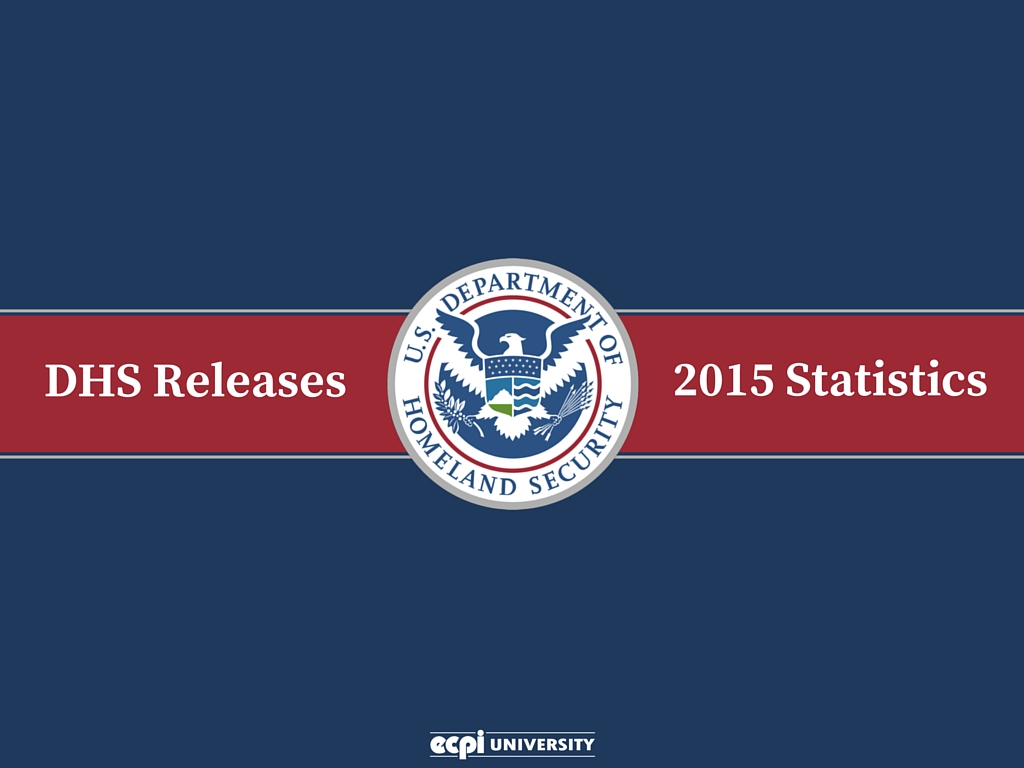
It started on September 11, 2001.
That was the day the United States came under attack by terrorists who used jets as weapons, killing thousands of innocent victims. At that moment, it became clear that the world had become increasingly dangerous, and the country would need a larger team to keep its citizens safe.
Many Americans joined the Armed Forces, intent to defend their country. Others applied for jobs with some of the United States’ federal departments and agencies. The country needed educated, skilled professionals to secure its borders, airports, seaports, and waterways—and the many people who answered the call were launched into successful and rewarding careers.
The Trend is Continuing Today
The country still needs dedicated professionals to protect it from threats.
The Department of Homeland Security, formed in 2002 from 22 separate federal departments and agencies, recently released statistics for their 2015 fiscal year which show there’s still plenty of work to be done. According to the information, the department is keenly focused on removing illegal migration to the United States by "convicted criminals and threats to public safety, border security, and national security."
This increased focus is good news for people interested in careers in homeland security, which might include working as a border patrol, customs agent, law enforcement professional or any other position that helps keep the country safe (according to a document published by the agency).
Careers with the U.S. Department of Homeland Security
There are many career tracks you can take with the Department of Homeland Security, ranging from policy analyst to a border patrol agent to a detention and deportation officer. Here's a look at some of the paths you can take:
Law Enforcement
There are more than 80 federal organizations that employ law enforcement agents and officers. One of the largest teams is composed of border patrol agents who monitor the borders in Florida, New York, California, and Arizona. These men and women prevent people who do not have a legal right to be in the country from getting in.
Between now and 2024, the need for border patrol agents is expected to grow by 4 percent (according to the U.S. Bureau of Labor Statistics, which lists the occupation along with police and detectives).
Counter-terrorism
Counter-terrorism jobs can include working as an intelligence operations specialist, a security specialist, an IT specialist or simply a security specialist. The people who do these jobs--and more--use their education, skills, training and experience to analyze data, monitor specific locations or organizations and protect the country's technological infrastructure to identify and arrest would-be terrorists before they can strike.
The National Counterterrorism Center is a great resource for learning more about career opportunities in counter-terrorism.
Emergency Management and Planning
With an increased level of attention being paid to preparing for and responding to emergencies, there is an increased need for experts in emergency management and planning (according to the U.S. Bureau of Labor Statistics).
These men and women are responsible for preparing plans, policies and procedures that allow government agencies to respond to natural disasters, large-scale emergencies and terrorist attacks. They assess hazards, work closely with public officials and representatives with private companies and analyze damage from disasters and emergencies to get things back to normal as quickly as possible.
Emergency management and planning experts don't just work for the Department of Homeland Security, either. They work for cities, businesses, large non-profit organizations, the Federal Emergency Management Agency, airports and many more agencies and organizations.
Physical Security
Buildings are one of any country's most important assets. Billions upon billions of dollars are invested in shopping malls, airports, hospitals, office buildings and seaports—and the government needs people who know how to keep them safe and secure.
Experts in physical security conduct risk analysis for physical structures and then develop plans to keep them safe. These plans can include classes for people in the buildings, procedures for responding to threats and ideas about how to prevent terrorists from making the buildings targets.
Ready to Step Up? Be In Demand with a Homeland Security Degree!
If you want to join the many men and women who have dedicated their careers to keeping the country safe, you have many options. In addition to those listed above, you could pursue a career as an expert in travel security, cybersecurity, public affairs and more.
But only if you have the education, skills and training needed to succeed.
If you are ready to step up and work to keep your country safe, connect with ECPI University today. Ask about the school's Homeland Security program and how you could earn your Bachelor of Science degree in Criminal Justice with a concentration in Homeland Security in less than three years--and then start working with the Department of Homeland Security, FEMA, a law enforcement agency or even private security. It could be the Best Decision You Ever Make!
I have been attending ECPI since August 2015, and could not be happier with the overall friendliness of the staff. They...
Posted by Nicole Ramey on Wednesday, February 3, 2016
DISCLAIMER – ECPI University makes no claim, warranty or guarantee as to actual employability or earning potential to current, past or future students or graduates of any educational program we offer. The ECPI University website is published for informational purposes only. Every effort is made to ensure the accuracy of information contained on the ECPI.edu domain; however, no warranty of accuracy is made. No contractual rights, either expressed or implied, are created by its content.
For more information about ECPI University or any of our programs click here: http://www.ecpi.edu/ or http://ow.ly/Ca1ya.


